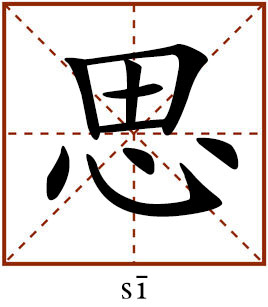Thought

When used as a verb, this character means "to think" or "to miss or long for." When used as a noun, it often refers to thought.
至今思项羽
zhì jīn sī xiàng yǔ
Zhi jin means "up to now" and si "to miss." Xiang Yu (232–202 BCE) was a Chinese general and leader of the rebel forces that tried to overthrow the Qin Dynasty (221–206 BCE).
This is a line from a poem by Li Qingzhao (1084–?), China's greatest female poet, whose work, though it survives only in fragments, continues to be as highly regarded as it was in her own day.
"Be a man of men with mettle while alive,/ And a soul of souls even if doomed to die!/ Xiang Yu, who would rather perish than survive/ By crossing the River, is held in esteem high!" (trans. Zhuo Zhenying)
Xiang Yu was known for his heroism and has been glorified in Chinese stories and poetry. After losing the final battle against Liu Bang, the founder of the Han Dynasty, Xiang Yu retreated to the bank of the Wu River (on the borderline of present-day Jiangsu and Anhui provinces), where a ferryman prepared a boat to take him across the river so that he would survive. Xiang Yu said that he was too ashamed to return home and face his people, because none of the first 8,000 men from Jiangdong who followed him on his conquests survived. He refused to cross the river and committed suicide at the bank.
In 1127, the Northern Song capital of Kaifeng, in present day Henan Province, fell to the Jurchens during the Jin–Song wars. The remaining Song forces withdrew, heading south of the Yangtze River to establish the Southern Song Dynasty. Li expressed her viewpoint clearly in the first two lines: One as a human being should be an outstanding talent and make contributions to the country; if one has to die, he should become a ghost hero after death.
Li felt very disappointed in the rulers of Southern Song, who fled as the country was invaded, leaving their people suffer. She was also ashamed of her husband Zhao Mingcheng, because he, as the magistrate for Jiangning (in present day Nanjing), fled when a rebellion broke out in the city of Jiangning in 1129. She used Xiang Yu to satirize the Song rulers and her husband. At the same time, she hoped heroic figures could recover the country’s lost territory.
Edited by REN GUANHONG

 PRINT
PRINT CLOSE
CLOSE